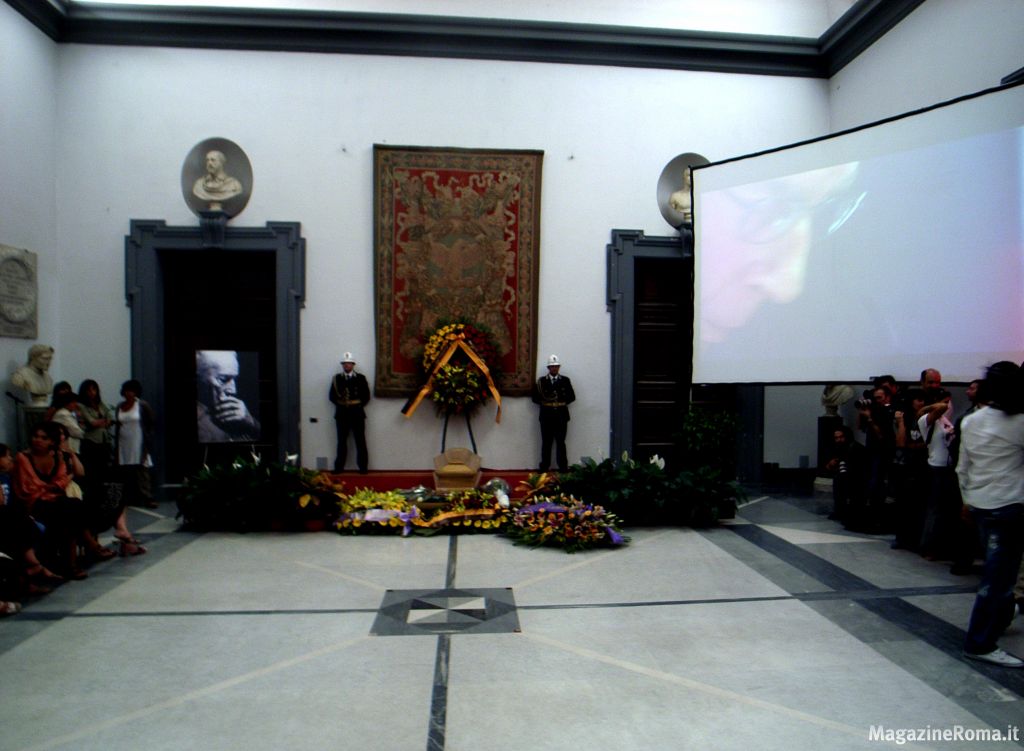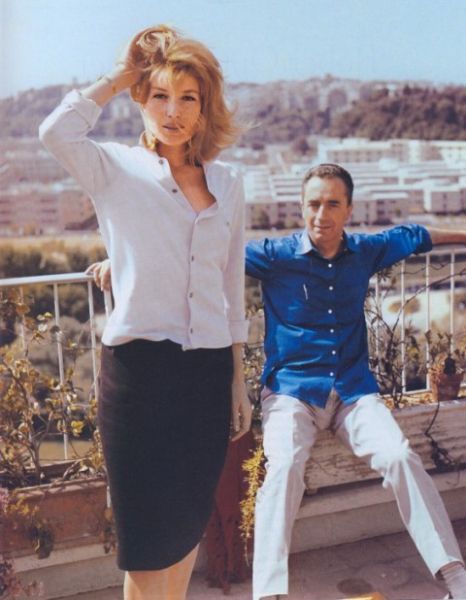afterword

The End of the last film of Michelangelo Antonioni

Monica Vitti at Antonioni’s home above the Tiber in happier times
But then, death had always seemed so close at hand.
Michelangelo Antonioni died on 30 July 2007 in his home in the Collina Flaminio-Tor di Quinto (“Fleming Hill”) quarter of Rome overlooking the Tiber where he had lived with his wife for the past 20 years. I had first heard of Antonioni’s death while in Umbria, some two hours by car to the north of Rome. I had just completed the book on L'eclisse two weeks earlier.
Antonioni’s body was placed in a closed, modest, wooden coffin for viewing in the Sala della Protomoteca at the Campidoglio of Rome. As was reported widely in the Italian press, very few people--numbering only in the hundreds--attended this “camera ardente” (“lying in state”). Near Antonioni’s coffin a large screen was placed upon which were projected images regarding his films interspersed with images of his life, the two, perhaps, indistinguishable.
The majority of the dignitaries were politicians. Few film directors were present, those few largely limited to old men including Ugo Gregoretti, Citto Maselli, Mario Monicelli, Francesco Rosi, Pasquale Squitieri, and Vittorio Taviani. These men, as decorum dictates at such events, spoke well of Antonioni. (One is reminded of Samuel Johnson’s observation that “In lapidary inscriptions a man is not upon oath.”) The directors generally remarked that Antonioni was more fun in real life than one might suspect from having seen his movies. Dino Risi commented that Antonioni had for years good-naturedly forgiven him for the joke that Risi had placed in the mouth of the character played by Vittorio Gassman in Il sorpasso concerning “La notte.” (In the 1962 masterwork of Risi, Il sorpasso, the main character played by Vittorio Gassman--a kind of narcissistic second cousin of L'eclisse’s main character, played by Alain Delon--asks the young, ingenuous law student played by Jean-Louis Trintignant, “Have you seen L'eclisse? Antonioni, a good director, but that movie . . . it put me to sleep.”) Risi had evidently misremembered his own film, confusing “La notte” with “L'eclisse.” But then, perhaps Antonioni’s films were already beginning to blur, as if one movie had become more or less the same as another. Risi’s gaffe--in the face of the enormity of death and the smallness and shriveled nature of one man’s corpse alone in a plain, wooden box, the final broken piece of wood at the very center of the city that once ruled a world--was itself, small and forgivable. Risi himself would be dead within a year.
No celebrated actors from Antonioni’s major films were present; once again, Monica Vitti and Alain Delon did not show up.
The presentation of the body was open to the public. Some tourists came and went, at least two of whom left notes aside the coffin. I do not know the contents of these private messages, but I did wonder whether these notes might contain doodles of daisies or quotations from Foscolo.
Five of Antonioni’s films were shown on Italian television the day following his death. I do not know who was responsible for choosing the five films which included Cronaca di un amore, La signora senza camelie, Il grido, Zabriskie Point, and The Passenger. Ratings (“dati auditel” [“Nielsen ratings”]) of the number of viewers who watched these films--published daily in the newspaper, LA NAZIONE--indicated that among the major Italian film network presentations, these films had the lowest share of viewers as compared to game shows and soap operas. The following day--the day preceding Antonioni’s funeral--Italian national television stopped showing any of Antonioni’s films. As Andrea Martini remarked in LA NAZIONE (1 Agosto 2007), “Antonioni non fu amato in una società divisa tra Peppone e Don Camillo.”
Much was made of the fact that Ingmar Bergman had died less than 24 hours before Antonioni’s death. It was widely noted that both of these elderly, European men had been generational giants of a kind of international art-house cinema that was approaching extinction. We were less commonly reminded in the flurry of obituaries and appreciations which ensued that Bergman found the majority of Antonioni's films worthless.*
Two days after the presentation of the coffin at the Campidoglio, Antonioni’s funeral was held in the Basilica di San Giorgio fuori le mura in Ferrara, where he had been baptized some 94 years earlier. Antonioni was then buried next to his only brother, Carlo Alberto--2 years his senior who had died in 1999--and had been laid to rest in the cemetery of Certosa in Ferrara. Despite all of the characters that Antonioni had created who wished to escape, Antonioni was buried where he was born. In my beginning is my end.
“Wer nie fortgeht, kommt nie heim.” German proverb
Antonioni did leave home to explore the entire world, even once expressing a desire to take a spacecraft to the moon if possible. Antonioni never made it to the moon—in fact, he extinguished it in “L'eclisse”—but he did return home at the end.
Enrica Fico Antonioni, Antonioni’s wife, was reported by the Italian press to have remarked that Antonioni had developed a greater interest in religion in recent years, although she noted that her husband had always been “deeply spiritual.” Ms. Antonioni was also reported as describing the last months of Antonioni’s life as being particularly agonizing. A terrible eclipse had occurred: the director to whom vision was so vital had become blind. According to Ms. Antonioni, her husband had expressed a will to die and had stopped eating. In an interview Ms. Antonioni gave in 2008 in LA STAMPA.it she remarked that her husband had stopped eating on his birthday after he had suffered sudden blindness. Ms. Antonioni remarked that “ . . . [He] almost wanted to dematerialize.” / “. . . che ha voluto quasi smaterializzarsi.” To vanish.
In other newspaper accounts in the Italian press Ms. Antonioni was quoted as stating that her husband showed no fear of death. Ms. Antonioni was elated that a full moon had hung over Rome the night of her husband’s death, and that the following morning Antonioni’s body was bathed in a pure white light highlighted by a rainbow produced by the sun’s rays striking a mirror in the bedroom where her husband’s body lay (“All’alba, quando un raggio di luce bianca, purissima, la luce che lui amava di più, si è posata sulla sua immagine, in camera da letto, e poi su uno specchio da cui si è divisa in tutti i colori dell’arcobaleno. Lui era quella luce . . .”).
The CORRIERE DELLA SERA reported that Antonioni had died at 20.00 hours.